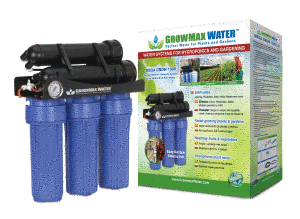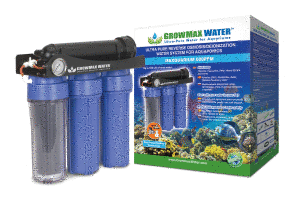Water quality and water hardness varies all over Europe, from Country to Country and even from city to city, town to town. It is important to convert hard water into soft water to be able irrigate your plants with the best quality water possible.
What is hard water?
Hard water is the one that concentrates a high volume of dissolved mineral salts, especially calcium and magnesium. The hardness is measured in milligrams of calcium carbonate per liter (mg /l). Depending on the concentration of magnesium and calcium in the water, we can talk about four types of water:
- Soft water (concentration of less than 150 mg / L of calcium carbonate)
- Semi Soft water (concentration between 150-200 mg / L calcium carbonate)
- Hard water (concentration between 200 and 400 mg / l of calcium carbonate)
- Very hard water (concentration between 400 and 550 mg / l of calcium carbonate.
Hard water can produce problems in the plants, like limescale precipitated in the root stem. When this happens, the plant cannot absorb the necessary nutrients, so if you add doses of nutrient solutions to the plant, they won’t have any effect on it. Moreover, if you want to add nutrient solutions of calcium and magnesium, you have to be careful with hard water, because you can cause a Nutrient Lock out: high amounts of these minerals in water, together with added doses of nutrients, can BLOCK or saturate plants roots, prohibiting them from absorbing the added nutrients.
Depending where you live, the water you receive at home has different dissolved salt levels. Living near mountains, near the sea or big cities are factors that affect the water quality. For example, take a look to this map of the water hardness at British islands:
London area has hard water, while Edinburgh appears as a soft water area. The most important thing is that wherever you live, you can improve the water quality, lower the EC level and change it into soft water. If you irrigate your plants with the best water quality, they will be healthier and faster growing. And this process is possible with RO systems.
Reverse osmosis (RO) to lower EC
A high amount of calcium and magnesium in the water we are using to irrigate can cause deficiencies in our plants. The only reliable way to remove dissolved salts in the water, or what is the same, lower the EC, is a Reverse Osmosis System.
What are the benefits of lowering the EC?
- First of all, you will get plants with healthier and stronger roots that absorb 100% of all the nutrients you add, avoiding dissolved mineral salt accumulation in the roots, such as limescale.
- You will guarantee more food for your plants, because when your water EC levels are low or even 0.0 (pure water) you can add the nutrients the plants really need, without worries about excess or lack of nutrients.
- Fertilizers you add will also be more effective, and ultimately, your plants will grow better and healthier, which means better results and therefore better quality and more profits.
GrowMax Water has designed a complete range of Reverse Osmosis Systems for hydroponics, starting at 20 L/h of pure water, and designed to minimize the waste water, with only (aprox.) a 2:1 (bad/good) ratio. All units include an installation kit for easy connection indoors or outdoor. These systems reduce up to 95% of dissolved salts in your water, lowering the EC in addition to removing chlorine.
Converting your hard water into pure water will provide your plants the quality water they deserve.
Visit our website and take a look of the range of reverse osmosis systems, and discover which one best suits your needs irrigation.







